Texas softball made program history on Friday, winning the 2025 Women’s College World Series (WCWS) to claim a first-ever national championship in their eighth trip to Oklahoma City.
The No. 6-seed Longhorns completed the best-of-three championship series with a dominant 10-4 victory over No. 12-seed Texas Tech, setting a program wins record with 56 on the season.
"This is why I came to Texas," said grad student first baseman Joely Mitchell following the championship win. "This is everything I dreamed of as a kid."
Anchored by star sophomore pitcher Teagan Kavan — who took home the tournament's Most Outstanding Player award after not allowing a single earned run in the nearly 32 WCWS innings she threw — Texas's title is the SEC's first in 10 years. The Longhorns now join only Florida and Alabama in the conference's elite NCAA softball champions club.
The Longhorn bats led the charge on Friday, plating five runs in the first inning — the most allowed in a single inning by Red Raiders superstar pitcher NiJaree Canady in her three-season NCAA career.
While that initial push ended up being enough to seal the win, senior third baseman Mia Scott put an exclamation mark on the victory by blasting a fourth-inning grand slam, notably doing so with a torn ACL.
2025 WCWS sets attendance, viewership records
The Longhorns' historic title run wasn't just a victory for Texas, however, as the 2025 WCWS claimed additional wins far beyond the Lone Star State.
With 119,778 fans packing into Oklahoma City's Devon Park across the nine-day competition, the 2025 tournament broke the WCWS attendance record.
The record-shattering didn't end there, as an average of 2.1 million viewers tuned into Thursday's championship series clash, making it the most-watched WCWS finals Game 2 in history — and the fifth most-watched NCAA softball game ever on ESPN platforms.
The rising value of college softball is also impacting players' bank accounts, with rising senior Canady reportedly inking a second seven-figure NIL deal to remain with Texas Tech prior to Friday's decisive Game 3.
"I've been around a lot of softball players, I've never been around a better teammate and a better person," Texas Tech head coach Gerry Glasco said about Canady following Friday's game. "She's an unbelievable talent. I believe she's the top player in college softball.... Her standards for everything is excellence."
The attendance, viewership, and NIL wins aren't just boosts for collegiate softball. The sport's rise is also fueling a new professional venture, with former NCAA stars launching pro league AUSL on Saturday — strategically timed to capitalize on the momentum of a historic 2025 WCWS.
The 2025 Women's College World Series (WCWS) are headed to a winner-take-all Game 3, as Texas Tech evened this week's best-of-three championship series with a 4-3 victory over Texas on Thursday.
Anchored by another gutsy performance from star pitcher NiJaree Canady, the Red Raiders capitalized on missteps by the Longhorns, plating their four runs thanks to a hit-by-pitch, a wild pitch, a sacrifice fly, and a fielding error.
Down but not out, Texas broke through with a sixth-inning home run from star senior Mia Scott before plating two more in the game's final frame.
With the tying run just 60 feet away, Canady locked in, ending the Longhorns' threat with a strike-out to claim Texas Tech's first season win over their state rivals at just the right time, keeping the Red Raiders' national title hopes alive.
"NiJa was huge," said Texas Tech head coach Gerry Glasco about his ace's Game 2 performance. "She went out there and pitched her tail off."
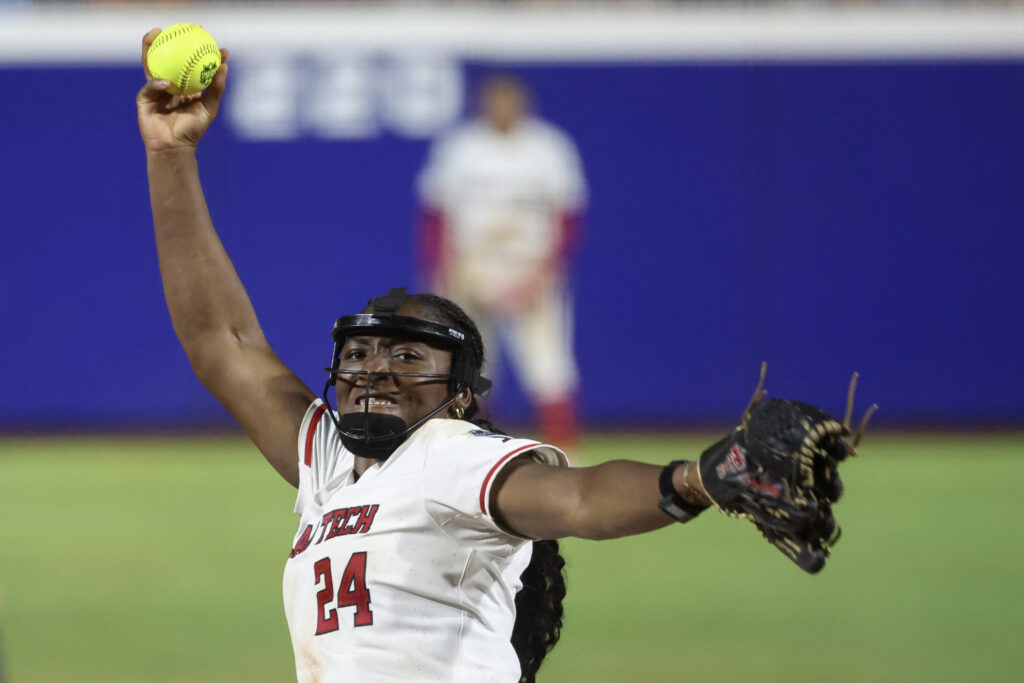
Canady likely to toss every Texas Tech pitch at WCWS
After Wednesday's botched intentional walk put Texas within one win of the NCAA trophy, Canady bounced back by again assuming control in the circle, tossing every Texas Tech pitch for the seventh postseason games in a row — a streak dating back to the Red Raiders' first Super Regional game.
"Obviously [Wednesday] night wasn't my best game. I feel like this game wasn't my best game, either," said Canady, despite stifling Texas's late surge. "I was just leaving it out on the field."
Glasco will undoubtedly tap Canady to throw Friday's decisive clash as well, with Texas Tech's championship hopes resting on their $1 million player.
Should she complete Game 3 and secure a program-first national championship in the process, Canady will become the first pitcher since 2012 Alabama ace Jackie Traina to toss every WCWS pitch for a title-winning team.
On the other hand, Texas's four-pitcher bullpen game means sophomore ace Teagan Kavan — who threw just two outs on Thursday night — should be fresh and ready to test the Red Raiders in the final game of the 2025 NCAA softball season.
How to watch the 2025 WCWS championship game
The decisive Game 3 of the 2025 WCWS championship series will take the field in Oklahoma City at 8 PM ET on Friday, with live coverage on ESPN.
Texas softball took Game 1 of the 2025 Women's College World Series (WCWS) championship series by topping in-state rivals Texas Tech 2-1 on Wednesday night, putting the Longhorns just one win away from clinching a program-first national championship.
"It's tight, especially when you're facing a good pitcher," said Texas catcher Reese Atwood, who delivered the game-winning hit. "Any momentum, any energy, we'll take it."
After a controversial obstruction call gifted Texas Tech a 1-0 lead in the top of the fifth, a rare misstep from Red Raiders ace NiJaree Canady gave Texas the daylight they needed to pull ahead.
With two Longhorns in scoring position and Atwood — the nation's RBI leader — stepping to the plate, Texas Tech head coach Gerry Glasco decided to take advantage of the vacant first base by instructing Canady to intentionally walk Atwood.
Noticing that Canady's intentional balls were dangerously close to the strike zone, Atwood capitalized, launching a game-winning two-run single on a 3-0 count — her first hit of the WCWS.
"Maybe it was the wrong decision. Maybe we should've went at her," said Glasco following the loss.
With up to two games left to play, the 2025 WCWS has already been a huge hit, averaging 1.1 million viewers on ESPN before the championship series even began — the network's highest pre-finals viewership on record.
While this year's NCAA tournament chases even more viewership history, Texas Tech will be hunting a Game 2 win to keep their championship dreams alive.
How to watch Game 2 of the 2025 WCWS championship series
The Red Raiders and Longhorns will square off again at 8 PM ET in Thursday's Game 2 of the best-of-three series, airing live on ESPN.
The Lone Star State is now ruling the 2025 Women's College World Series (WCWS), with the Texas Longhorns and Texas Tech Red Raiders taking the NCAA softball field for the national tournament's best-of-three championship series for the first time on Wednesday night.
No. 6-seed Texas reached the final round with a 2-0 semifinal win over SEC foe No. 7 Tennessee on Monday, while No. 12 Texas Tech denied defending champion Oklahoma a chance to extend their historic record, ending the No. 2 seed's hunt for a fifth straight NCAA title with a dramatic 3-2 semifinal ousting.
Pitching will take center stage throughout the championship series, as the regional rivals each boast a stellar ace in the circle in Texas Tech transfer junior and this season's National Pitcher of the Year NiJaree Canady and Texas star sophomore Teagan Kavan.
Texas packs experience against Cinderella Texas Tech
While both programs are searching for their first-ever national championship, the more experienced Longhorns have the edge entering this week's competition.
This year marks Texas's eighth overall trip to the WCWS and the Longhorns' third championship series appearance in the last four years, having fallen to Oklahoma in both 2022 and 2024.
Meanwhile, Texas Tech is still blazing trails through brand-new territory, adding a WCWS finals debut to an already-historic 2025 run that included the Red Raiders' first Super Regional appearance and win, and first-ever WCWS berth.
The Longhorns also own this season's head-to-head record over the Red Raiders, snagging two wins over Texas Tech in February.
However, while Kavan threw both those games, including an 11-0 run-rule victory, Canady only featured in one — a narrow 2-1 extra-inning Texas Tech loss in which the deciding run crossed on a throwing error.
Though the Red Raiders are technically the underdogs of this week's championship series, the likely pitchers' duel between Canady and Kavan means that the 2025 WCWS title is anyone's for the taking.
How to watch the 2025 WCWS championship series
The best-of-three 2025 WCWS championship series between Texas and Texas Tech starts on Wednesday, with Game 2 set for Thursday and, if necessary, a winner-take-all final tilt on deck for Friday.
All of the 2025 WCWS championship series clashes will begin at 8 PM ET, airing live on ESPN.
The Sooners' hunt for a fifth straight NCAA softball title is officially over, as No. 12-seed Texas Tech ousted No. 2-seed Oklahoma 3-2 in Monday's 2025 semifinals to book a trip to their first-ever Women's College World Series (WCWS) finals.
With a total of eight national championships under their belt, this year's WCWS marks Oklahoma's earliest exit since 2018.
Calling it "a great privilege" to play the modern dynasty that is Oklahoma softball, Red Raiders head coach Gerry Glasco said "This was our chance at forever — to leave a legacy at Texas Tech that will be remembered forever. Our team has done that. They've left a legacy."
Seventh-inning heroics end in dramatic Texas Tech victory
Prior to this season, the Red Raiders had never advanced out of the Regional round in their six previous appearances in the NCAA tournament.
With the addition of Stanford transfer and 2025 National Pitcher of the Year NiJaree Canady — college softball's first $1 million player — Texas Tech has put together a magical run all the way to this week's best-of-three championship series.
Canady's seven-inning showing on Monday nearly clinched the Red Raiders win, as the ace protected Texas Tech's second-inning 2-0 lead until the game's final frame.
Down to their last strike, junior outfielder Abigale Dayton played hero for the Sooners, blasting a two-run homer to tie the score and keep Oklahoma's hopes alive in the top of the seventh.
The bottom of the inning, however, was all Texas Tech, as Raiders first baseman Lauren Allred popped up a deep-enough sacrifice fly to score junior centerfielder Mihyia Davis from third, walking off the 3-2 win.
"Honestly, it was a very cinematic way to go out," Oklahoma first baseman Cydney Sanders — one of just three seniors on the young 2025 Sooners' squad — said of Monday night's late-inning WCWS dramatics.
2025 WCWS will crown a first-ever national champion
This week's championship series, which kicks off on Wednesday night, will now be an all-Texas affair, after the No. 6-seed Texas Longhorns also advanced with a 2-0 Monday win over No. 7-seed Tennessee.
Not only will the 2025 NCAA trophy be heading to the Lone Star State, this year's tournament will also crown a first-time victor: Despite their seven previous WCWS appearances and a now-third trip to the championship series in the last four years, the Longhorns — like the Red Raiders — have yet to hoist softball's national hardware.
The 2025 Women's College World Series begins today, with the sport's most prestigious organizations taking advantage of this week's NCAA softball spotlight to bestow awards on the season's top athletes.
Arkansas first baseman Bri Ellis earned USA Softball's 2025 Collegiate Player of the Year title on Tuesday, with the senior beating out a shortlist that included Nebraska pitcher Jordy Bahl and Texas Tech ace NiJaree Canady — who won the award in her 2024 sophomore season.
A menace at the plate, Ellis led the NCAA in on-base (.639) and slugging percentages (1.090). She finished the year with 26 home runs — the third-most in the nation — while racking up 72 RBIs, both setting single-season records for the Razorbacks.
Wednesday saw both Bahl and Canady take home hardware of their own, with the National Fastpitch Coaches Association naming the Nebraska redshirt junior their 2025 National Player of the Year while the Texas Tech transfer snagged Pitcher of the Year for the second straight season.
A two-time national champion with Oklahoma before transferring to the Cornhuskers, Bahl is the only player to rank in the Top 10 for both batting average and ERA, claiming multiple program records at the plate while tossing 26 wins from the circle. This season, she became just the fifth Division I athlete to ever record 20+ wins and 20+ home runs in a single campaign.
Another two-way titan, Canady leads the nation with a lights-out 0.89 ERA on the season, allowing a Division I-low of 3.65 hits per seven innings while leading the Red Raiders in long-ball production with 11 home runs.
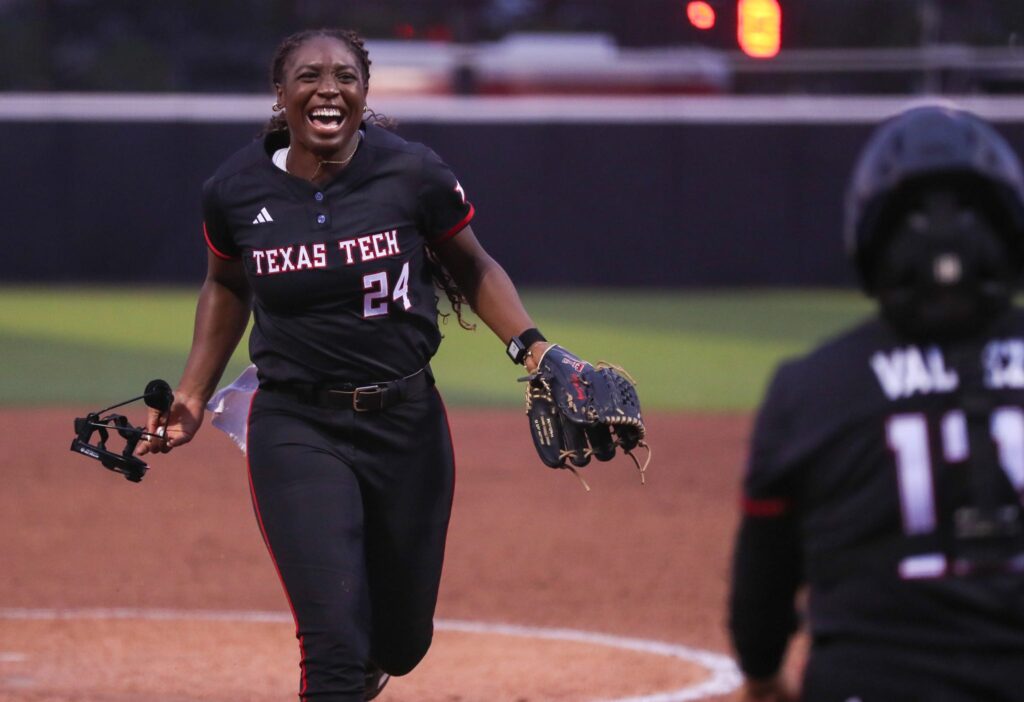
How to watch the winners of the 2025 college softball awards
Despite their individual achievements, only Canady's Texas Tech survived last weekend's Super Regionals, meaning fans must wait until the 2026 NCAA season to catch rising Nebraska senior Bahl back in action.
It's a shorter wait to watch Ellis, however, as the Arkansas grad will begin her pro career with the Talons in the brand-new Athletes Unlimited Softball League, which starts its inaugural season on June 7th.
As for Canady, she'll look to take the Red Raiders on a deep run in Oklahoma City. No. 12-seed Texas Tech will face unseeded Ole Miss in both teams' first-ever WCWS game at 7 PM ET on Thursday, airing live on ESPN2.
SEC firepower will fuel the 2025 Women's College World Series (WCWS), as No. 2 Oklahoma, No. 3 Florida, No. 6 Texas, No. 7 Tennessee, and unseeded Ole Miss all advanced out of this weekend's Super Regionals to book trips to Oklahoma City.
The SEC's five teams ties the record for most WCWS-bound squads from a single conference, with the additions of former Big 12 powerhouses Oklahoma and Texas notably boosting the league's WCWS roster this year.
Big Ten newcomers No. 9 UCLA and No. 16 Oregon plus the Big 12's No. 12 Texas Tech round out the eight teams entering the double-elimination tournament later this week, all battling for one of two spots in next week's best-of-three championship series.
Despite coming into the postseason as the No. 2 seed, the Sooners are still the team to beat as they hunt their fifth straight NCAA softball title.
With their 18th program ticket to OKC, Oklahoma's consistency in advancing to the national championship's last stop is dwarfed only by UCLA: The Bruins have appeared in 34 editions of the WCWS, missing the final cut only nine times in NCAA history.
In contrast, both Ole Miss and Texas Tech will be making their WCWS debuts after upsetting top seeds last weekend.
The Rebels, who first eliminated No. 13 Arizona in Regionals, outlasted No. 4 Arkansas to book their first-ever WCWS trip on Sunday.
Meanwhile, the Red Raiders are flying high behind transfer pitcher and 2024 National Player of the Year NiJaree Canady, emerging victorious in their first-ever Super Regional with two straight wins over No. 5 Florida State.
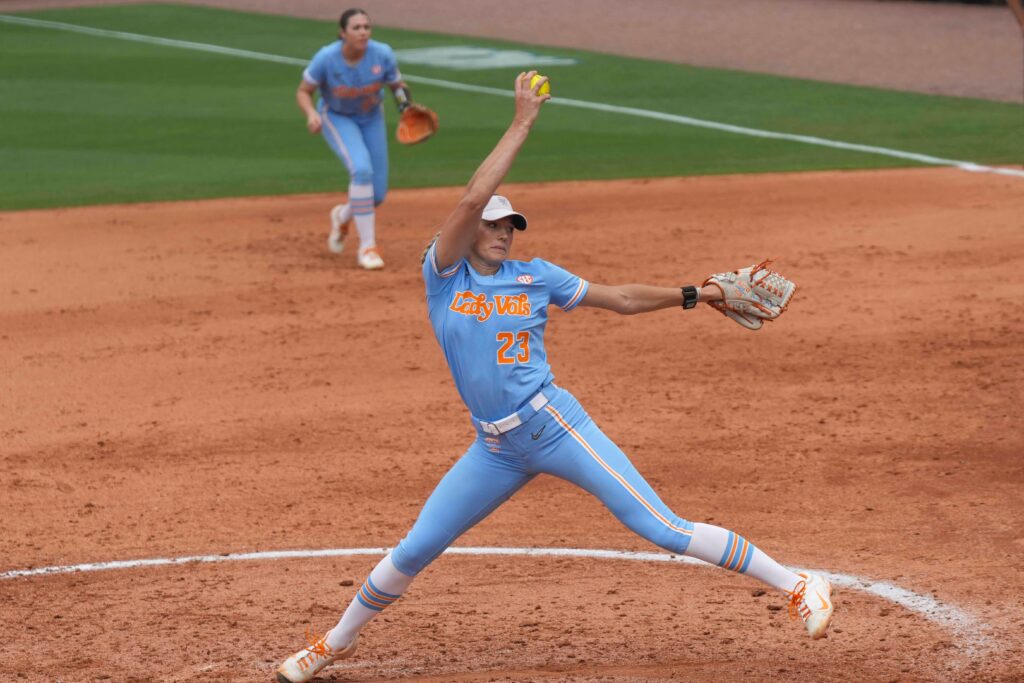
How to watch the 2025 Women's College World Series
Oklahoma City veterans and debutants alike will begin their WCWS campaigns on Thursday, when all teams will contend in the tournament's initial four games.
Kicking off the 2025 WCWS is an all-SEC afternoon session, with No. 6 Texas facing No. 3 Florida at 12 PM ET before No. 7 Tennessee takes on No. 2 Oklahoma at 2:30 PM ET.
Evening play pits the newcomers against each other as Ole Miss clashes with No. 12 Texas Tech at 7 PM ET, with a Big Ten battle between No. 16 Oregon and No. 9 UCLA closing out the night at 9:30 PM ET.
Live coverage of the afternoon games will air on ESPN, with ESPN2 broadcasting the two evening matchups.
After a first-round weekend of pitcher's duels and red-hot bats, the 2025 NCAA softball tournament's best-of-three Super Regionals field is set — and it's missing four of the 16 national seeds.
No. 10 LSU fell on Saturday after two upset losses to unseeded SE Louisiana, before Sunday saw No. 13 Arizona and No. 14 Duke follow suit while unseeded Ole Miss, Georgia, and Nebraska all punched second-round tickets.
Eventually ousting SE Louisiana in the winners' bracket to advance to their first Super Regionals in 11 years, the Huskers rode in on the back of two-time All-American pitcher Jordy Bahl, with the Oklahoma transfer throwing 12 innings and hitting four home runs across Nebraska's three Regional games.
Elsewhere, unseeded Liberty booked a program-first trip to the Supers by eliminating top-seed Texas A&M — the first time the NCAA bracket's overall No. 1 seed failed to advance from Regionals.
Should they similarly bounce No. 16 Oregon this weekend, Liberty will become just the second mid-major team to make the Women's College World Series (WCWS) since 2014, joining James Madison's 2021 Cinderella run.
Rounding out the rest of the Super Regional round's 16 teams are No. 2 Oklahoma, No. 3 Florida, No. 4 Arkansas, No. 5 Florida State, No. 6 Texas, No. 7 Tennessee, and No. 8 South Carolina, as well as No. 9 UCLA, No. 11 Clemson, No. 12 Texas Tech, No. 15 Alabama, and the aforementioned No. 16 Ducks.
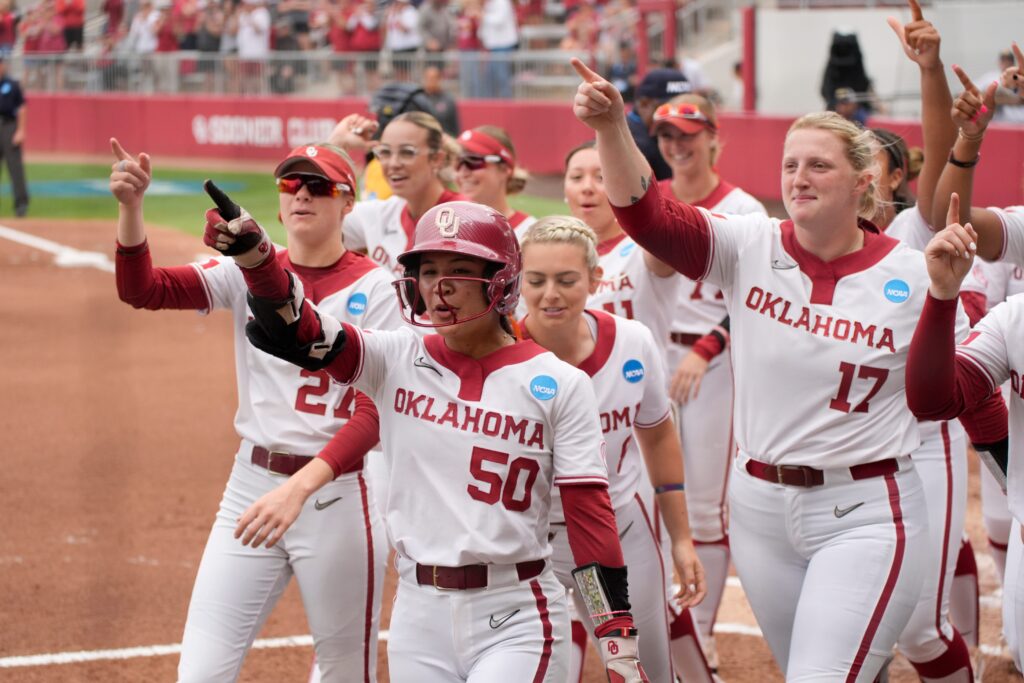
Super Regional weekend to feature blockbuster matchups
The 16 contenders will battle head-to-head for eight available WCWS berths, with the four-time defending champion Sooners now leading the field.
To advance, however, Oklahoma must first outlast Alabama, a team with which the Sooners have a long, contentious postseason history — the pair have faced off in five of the last 12 NCAA tournaments.
After Oklahoma bounced Alabama from the 2019 WCWS semifinals — the last time the pair squared off before becoming SEC rivals — the Tide enacted revenge by narrowly beating the Sooners in April's conference play, teeing up a tense weekend Super Regional series.
After narrowly missing this weekend's hosting rights as the No. 9 seed — UCLA's lowest seeding since 2016 — the Bruins proved why they are the sport's winningest program, run-ruling ever Regional game while allowing just two runs all weekend.
The 12-time champions will now travel to Gamecock territory, where No. 8 South Carolina will try to boost the Bruins and book their first WCWS ticket in 28 years.
Powerhouses still rule the diamond, but parity has never been higher in college softball, with this year's NCAA tournament already delivering whiplash results.

How to watch the 2025 NCAA softball Super Regionals
The best-of three NCAA softball Super Regionals kick off on Thursday and run through the weekend, with possible winner-take-all clashes finalizing the WCWS slate on Sunday.
First games are as follows:
- No. 12 Texas Tech at No. 5 Florida State, 7 PM ET on Thursday (ESPN2)
- No. 11 Clemson at No. 6 Texas, 9 PM ET on Thursday (ESPN2)
- Georgia at No. 3 Florida, 11 AM ET on Friday (ESPN2)
- No. 9 UCLA at No. 8 South Carolina, 1 PM ET on Friday (ESPN2)
- No. 15 Alabama at No. 2 Oklahoma, 5 PM ET on Friday (ESPN2)
- Nebraska at No. 7 Tennessee, 7 PM ET on Friday (ESPN2)
- Ole Miss at No. 4 Arkansas, 8 PM ET on Friday (ESPNU)
- Liberty at No. 16 Oregon, 10 PM ET on Friday (ESPNU)
For the first time in program history, Texas A&M is the No. 1 seed in the NCAA softball tournament, with the Aggies staving off four-time reigning champion Oklahoma for the honor in Sunday's 2025 bracket drop.
After adverse weather canceled their conference title game on Saturday, the Aggies and No. 2-seed Sooners became 2025 SEC tournament co-champions, leaving the NCAA selection committee to lean heavily on each team's strength of schedule in making their top-seed decision.
"What set apart Texas A&M is they have 19 Top 25 wins, which is number one in the country," said NCAA softball committee chair Kurt McGuffin on Sunday's ESPN2 broadcast, noting the Aggies' tough nonconference schedule.
Taking on a lighter nonconference slate than usual due to massive roster turnover following the 2023/24 season, Oklahoma relied heavily on their record in a stacked SEC, finishing one half-game ahead of A&M in regular-season play.
While the Sooners look to extend their championship streak, the Aggies will be hunting their third national title and first since 1987.
Standing in their way in the 64-team bracket are a record number of familiar foes, as the SEC boasts 14 teams in the 2025 NCAA competition — the most from any single conference in tournament history.
Even more, nine of the bracket's 16 seeded teams hail from the SEC, and a full seven of the Top 8.
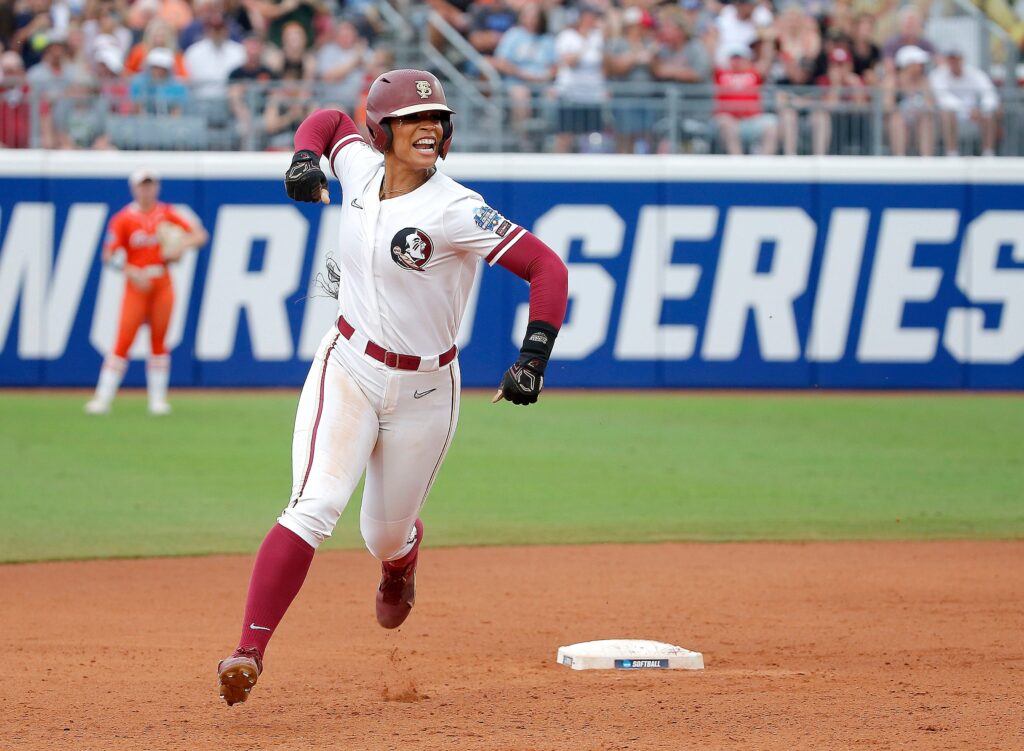
Conference champs, at-large teams score NCAA bracket spots
SEC squads aren't the only teams looking to topple Texas A&M and Oklahoma, however, as conference champions and other elite squads learned their tournament fates on Selection Sunday.
No. 5 Florida State is the highest seeded non-SEC team, despite falling 2-1 to No. 11-seed Clemson in Saturday's ACC title game. Along with No. 14-seed Duke, the ACC will see nine teams in the 2025 tournament.
Behind 2024 National Player of the Year NiJaree Canady — the nation's top pitcher — Texas Tech leads a five-team contingent from the Big 12 after securing both their conference tournament trophy and the national No. 12-seed this weekend.
In the weekend's most upset-filled conference tournament, unseeded Michigan outlasted both No. 9-seed UCLA and No. 16-seed Oregon to score a second straight Big Ten tournament title on Saturday, becoming one of eight teams repping the conference in Sunday's bracket.
Notably, the Bruins — the winningest program in NCAA softball history with 12 titles — have not entered the tournament lower than a No. 6 seed since 2016.
How to watch the 2025 NCAA softball tournament
The road to the 2025 Women's College World Series begins with Regionals, in which each of the 16 seeded teams will host a four-team double-elimination mini-tournament this weekend.
With a minimum of 96 games — and a possibility of 112 — Regional play begins at 12 PM ET on Friday, with the 64-team field narrowing to 16 by Sunday night.
All games will air live across ESPN's networks.
College softball closed out regular-season play over the weekend, transitioning into a slate of cutthroat conference tournaments ahead of this year's 64-team NCAA Division I tournament.
Starting on Tuesday and running through Saturday, the 31 single-elimination softball conference tournaments will determine the champions who will automatically book their postseason tickets with their trophies.
The NCAA committee will award the remaining 33 bracket spots during this weekend's upcoming Selection Sunday show.
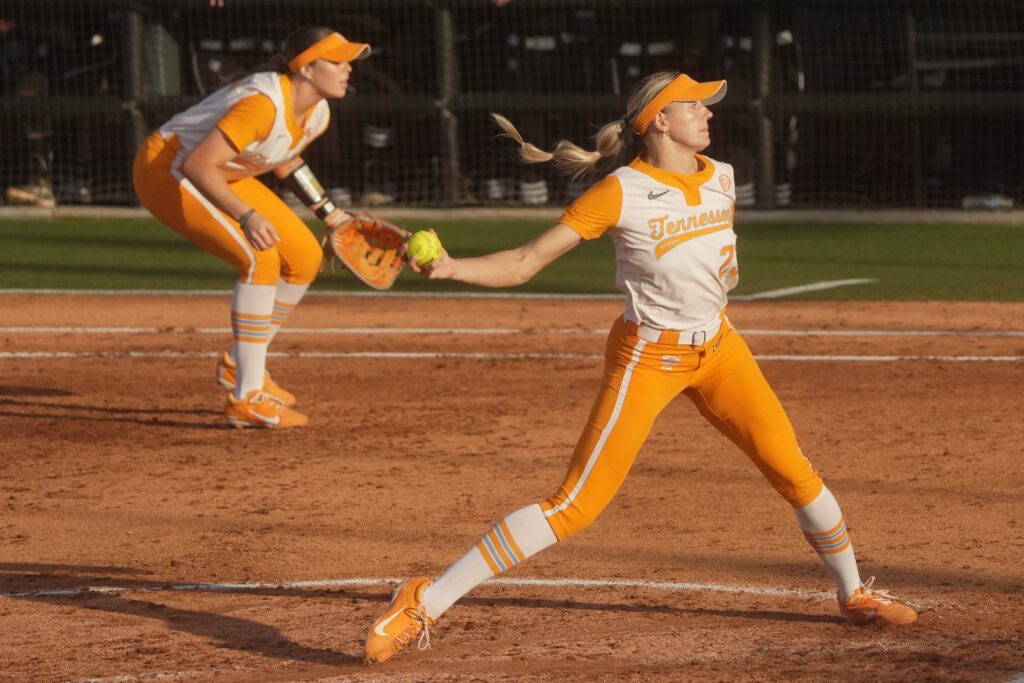
SEC dominance sets up blockbuster conference tournament
Thanks in part to recent conference realignment, the powerhouse SEC appears to have the college softball landscape on lock this year, with this week's tournament likely providing a sneak peek of the national tournament.
With the addition of newcomers No. 2 Oklahoma and No. 5 Texas — and led by current national No. 1 Texas A&M — seven of the Top 10 Division I teams hail from the SEC, including all of the Top 6.
Despite some growing pains — and seven conference losses — the defending champion Sooners will look to again lead the pack as they hunt a fifth straight Women’s College World Series title.
Joining the Sooners, Longhorns, and Aggies in pursuit of the SEC crown — and perhaps the national trophy, as well — are No. 3 Tennessee, No. 4 Florida, and No. 6 Arkansas.
How to watch the SEC softball conference tournament
With the conference's top teams earning byes through to later rounds, the SEC tournament begins when unranked Georgia takes on unranked Kentucky at 1 PM ET on Tuesday.
Later, No. 21 Ole Miss will battle unranked Missouri at 4 PM ET, before No. 16 Alabama wraps up the SEC's first round against unranked Auburn at 7 PM ET.
All three Tuesday games will air live on the SEC Network.